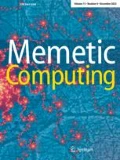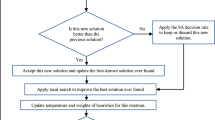Abstract
In this paper, a self-adaptive differential evolution (DE) algorithm is designed to solve multi-objective flow shop scheduling problems with limited buffers (FSSPwLB). The makespan and the largest job delay are treated as two separate objectives which are optimized simultaneously. To improve the performance of the proposed algorithm and eliminate the difficulty of setting parameters, an adaptive mechanism is designed and incorporated into DE. Moreover, various local search and hybrid meta-heuristic methods are presented and compared to improve the convergence. Through the analysis of the experimental results, the proposed algorithm is able to tackle the FSSPwLB problems effectively by generating superior and stable scheduling strategies.














Similar content being viewed by others
References
Abdellah S, Rodriguez J (2014) Tailoring hyper-heuristics to specific instances of a scheduling problem using affinity and competence functions. Memet Comput 2(6):77–84
Alhindi A, Zhang, Q (2014) MOEA/D with tabu search for multiobjective permutation flow shop scheduling problems. In: IEEE congress on evolutionary computation, pp 1155–1164
Brucker P, Heitmann S, Hurink J (2003) Flow-shop problems with intermediate buffers. OR Spectr 25(4):549–574
Czyzzak P, Jaszkiewicz A (2015) Pareto simulated annealinga metaheuristic technique for multiple-objective combinatorial optimization. J Multi-Criteria Decis Anal 7(1):34–47
Li W, Nault B, Ye H (2019) Trade-off balancing in scheduling for flow shop production and perioperative processes. Eur J Oper Res 273(3):817–830
Han Y, Gong D, Jin Y, Pan Q (2017) Evolutionary multiobjective blocking lot-streaming flow shop scheduling with machine breakdowns. IEEE Trans Cybern 1(99):1–14
Han Y, Liang J, Pan Q, Li J, Sang H, Cao N (2013) Effective hybrid discrete artificial bee colony algorithms for the total flowtime minimization in the blocking flowshop problem. Int J Adv Manuf Technol 67(1–4):397–414
Khan A, Christian N (2018) A differential evolution based approach for the production scheduling of open pit mines with or without the condition of grade uncertainty. Appl Soft Comput J 66:428–437
Leisten R (1990) Flowshop sequencing problems with limited buffer storage. Int J Prod Res 11(28):2085–2100
Li J, Pan Q (2015) Solving the large-scale hybrid flow shop scheduling problem with limited buffers by a hybrid artificial bee colony algorithm. Inf Sci 316:487–502
Liang J, Wang P, Yue C, Yu K, Li Z, Qu B (2018) Multi-objective brainstorm optimization algorithm for sparse optimization. In: IEEE congress on evolutionary computation. https://doi.org/10.1109/CEC.2018.8477789
Liu B, Wang L, Jin Y (2007) An effective PSO-based memetic algorithm for flow shop scheduling. IEEE Trans Syst Man Cybern 37(1):18–27
Loukil T, Teghemb J (2005) Solving multi-objective production scheduling problems using metaheuristics. Eur J Oper Res 161(1):42–61
Mou J, Li X, Gao L, Yi W (2018) An effective L-MONG algorithm for solving multi-objective flow-shop inverse scheduling problems. J Intell Manuf 29(4):789–807
Pan Q, Suganthan P, Wang L, Gao L, Mallipeddi R (2011) A differential evolution algorithm with self-adapting strategy and control parameters. Comput Oper Res 38(1):394–408
Peng K, Pan Q, Gao L, Zhang B, Pang X (2018) An improved artificial bee colony algorithm for real-world hybrid flowshop rescheduling in steelmaking-refining-continuous casting process. Comput Ind Eng 122:235–250
Qian B, Wang L, Huang D, Wang X (2009) An effective hybrid DE-based algorithm for multi-objective flow shop scheduling with limited buffers. Comput Oper Res 33(10):2960–2971
Qin A, Huang V, Suganthan P (2009) Differential evolution algorithm with strategy adaptation for global numerical optimization. IEEE Trans Evol Comput 13(2):398–417
Soares C, Scotto M (2004) Application of the \(r\) largest-order statistics for long-term predictions of significant wave height. Coast Eng 51(5):387–394
Storn R, Price K (1997) Differential evolution: a simple and efficient heuristic for global optimization over continuous spaces. J Global Optim 4(11):341–359
Ta Q, Billaut J, Bouquard J (2018) Matheuristic algorithms for minimizing total tardiness in the \(m\)-machine flow-shop scheduling problem. J Intell Manuf 29(3):617–628
Tasgetiren M, Liang Y, Sevkli M, Gencyilmaz G (2004) Differential evolution algorithm for permutation flowshop sequencing problem with makespan criterion. IEEE Trans Cybern 20(5):682–694
Vallada E, Ruiz R (2010) Genetic algorithms with path relinking for the minimum tardiness permutation flowshop problem. Int J Manag Sci 38(1):57–67
Venske S, Gon AR, Delgado M (2014) ADEMO/D: multi-objective optimization by an adaptive differential evolution algorithm. Neurocomputing 127(127):65–77
Wang Y, Wu L, Yuan X (2010) Multi-objective self-adaptive differential evolution with elitist archive and crowding entropy-based diversity measure. Soft Comput 14(3):193–209
Zhao F, Chen Z, Wang L, Zhang C (2016) An improved MOEA/D for multi-objective job shop scheduling problem. Int J Comput Integr Manuf 30(6):616–640
Ziad K, Raeesi M (2012) A memetic algorithm for job shop scheduling using a critical-path-based local search heuristic. Memet Comput 3(4):231–245
Gong D, Han Y, Jin Y (2018) A novel hybrid multi-objective artificial bee colony algorithm for the blocking lot-streaming flow shop scheduling problems. Knowl Based Syst 148:115–130
Han Y, Li J, Gong D (2019) Multi-objective migrating birds optimization algorithm for stochastic lot-streaming flow shop scheduling with blocking. IEEE Access 7(1):5946–5962
Author information
Authors and Affiliations
Corresponding author
Ethics declarations
Funding
The work is supported by National Natural Science Foundation of China (61876169, 61673404, 61473266, and 61806179), Project supported by the Research Award Fund for Outstanding Young Teachers in Henan Provincial Institutions of Higher Education of China (2014GGJS-004 and 2016GGJS-094) and Program for Science & Technology Innovation Talents in Universities of Henan Province in China (16HASTIT041 and 16HASTIT033), Scientific and Technological Project of Henan Province (152102210153), China Postdoctoral Science Foundation(2017M622373).
Additional information
Publisher's Note
Springer Nature remains neutral with regard to jurisdictional claims in published maps and institutional affiliations.
Rights and permissions
About this article
Cite this article
Liang, J., Wang, P., Guo, L. et al. Multi-objective flow shop scheduling with limited buffers using hybrid self-adaptive differential evolution. Memetic Comp. 11, 407–422 (2019). https://doi.org/10.1007/s12293-019-00290-5
Received:
Accepted:
Published:
Issue Date:
DOI: https://doi.org/10.1007/s12293-019-00290-5




